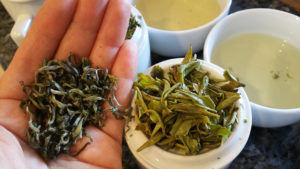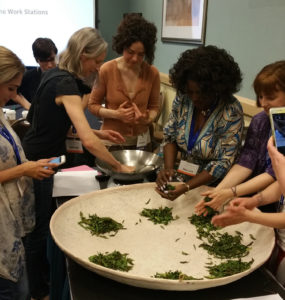“Put it before them briefly so they will read it, clearly so they will appreciate it, picturesquely so they will remember it and, above all, accurately so they will be guided by its light.” – Joseph Pulitzer
At the heart of every journey is a purpose. For Tea Journey magazine, that purpose and North Star is education. It’s the viewpoint and guiding principle for the content we develop and how we tell our stories.
What do we mean by education, exactly? Of whom and how? To answer this, let’s take a broader look at the role of education in our marketplace.
Why so slow, Tea?
Observers have long complained that tea lags behind the sophistication and development of beverages like coffee, wine and beer. By sophistication and development, let’s be clear – we’re not talking about quality of flavor or complexity. Rather, the argument is that tea has been… well, slow. That is, slow to adopt a more contemporary approach to brewing styles and service settings. Tea seems uncertain how to develop relationships with an eager audience – an audience who wants to know more about everything they eat and drink. Tea is lacking a creative spark for collaborations and expression between industries. Mostly, the perception is that tea is keeping to itself. Tea is seen as either an unquestioned everyday staple, or something so sacred and mysterious that “outsiders” just don’t get. However, I see neither of these representations of our friend Tea as entirely accurate.
By contrast, our friends in coffee are enjoying remarkable success evolving with the times. Their customers are able to slow down for a hand-brewed pour over, to understand the higher cost of directly traded beans, and to invest in their passion through professional certification. Meanwhile, beer brewers practically invented the “collab”, by working with fellow brewers, wine makers, coffee roasters, chocolatiers and tea producers to push the boundaries of what we know as beer. Wine masters influence the marketing trends for all of these beverages, through their intensive training and expansive knowledge. Perhaps most importantly, knowledge is no longer considered obscure or trivial. Because of wine, knowledge is seen as immediately relevant to enjoyment.
This is why education is our mandate at Tea Journey.
Tea Journey’s Educational Mandate
First of all, at Tea Journey, we are making a distinction between education purely for academic pursuit and education directly beneficial to the readership.

An untold numbers of books and publications already take on a varying level of highly scientific and technical knowledge about tea. Of course, Tea Journey also features the technical craft, agronomy, health science, and cultural impact of tea. We take it a step further, though, by looking at each piece and asking how will it benefit YOU. Will you learn how to spot critical differences between similar teas? Will you better understand why a particular type tends to be so rare and so expensive? Will you have your eyes opened to a newly accessible origin?
To that end, we function very much like a traditional newsroom. We question the motive and goal of each piece, who and why we are interviewing, and what photos and video we want to bring back from the field.
Second, we seek to apply this idea of focused education toward a more nuanced approach to audience.
Initially, we saw Tea Journey as primarily a consumer magazine. Meaning, it would not feature content typical to a trade publication (sales growth by category trends, business deals, etc.). However, with our launch issue, we saw strong response from consumers AND businesses alike, across multiple markets and continents. So, in our process of coming together as an editorial staff, we now have a more clear distinction. We believe Tea Journey can exist between worlds as a vehicle for better communication.

We identified four key pillars in our audience base: Consumers, tea retailers, restauranteurs and sommeliers, producers and importers/wholesalers. So, we will nurture cross-educational opportunities to improve communication between these sectors. This includes featuring stories, content and usable features that increase understanding of the world of specialty tea. We’ve seen growers who produce hand-sorted labor of love teas, while at the same time struggling to find a buyer for their bread and butter broken leaf grades. It’s not about one small segment. The gravity of our mission is as simple as that.
Our mission has a third mandate: To make this journey interactive in ways digital publishing is only just barely exploring. This is something we will do together, from our reporters around the world, to our multinational editorial staff and advisors, to our readership from America to Argentina, Iceland to India. Without brand or agenda.
What inspires you to the call of education?
For me, education was where I found my “self”, what I feel I was meant to do. Nearly 14 years ago, I worked in a very different world. As a broadcast news producer, I was part of a team that selected, assigned, wrote and delivered stories to the community each morning and evening. Navigating the responsibility and challenges of such a career is rewarding, no doubt. It’s said if you can do live television, you can do anything! Yet something about it wasn’t quite what I was seeking from journalism. I didn’t have words for it yet, but the feeling was heavy, along with the stress.
So I walked away. I found steady friendship in the study of coffee and tea, even though I didn’t know what I was “doing with my life” just yet. Tea showed me a cultural bond bigger than anything I would ever personally understand in my lifetime. For the first time, I found that idea inspiring rather than intimidating. Through the storytelling and communication skills I learned as a journalist, sharing this message became the path to self-actualization. Tea has allowed me years of quiet introspective study. It has also served as a vehicle for getting outside of myself. Everyone is called to Tea for a reason.
Tea is not just about one story. Tea is a global inheritance that we all share.
Subscribe to Tea Journey to learn more about fine tea.